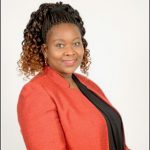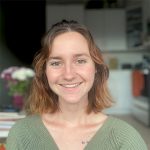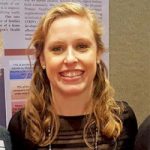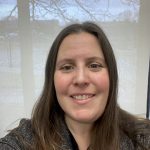 Congratulations to Hyanghee Lee (’18 PhD), who is now an assistant professor of Educational Psychology at University of North Texas.
Congratulations to Hyanghee Lee (’18 PhD), who is now an assistant professor of Educational Psychology at University of North Texas.
Author: Janice Berriault
Alumna Mamta Saxena receives NCFR Teaching Award
 Congratulations to Mamta Saxena (’13 PhD HDFS), for winning second place in the NCFR Cognella Innovation in Teaching Family Science Award. Read more about it here https://www.ncfr.org/news/3-ncfr-members-recognized-2022-innovation-teaching-family-science
Congratulations to Mamta Saxena (’13 PhD HDFS), for winning second place in the NCFR Cognella Innovation in Teaching Family Science Award. Read more about it here https://www.ncfr.org/news/3-ncfr-members-recognized-2022-innovation-teaching-family-science
Marea Tsamaase, HDFS Alumni Spotlight, January 2023
 Marea Tsamaase received her Ph.D. from HDFS in May 2019. Prior to joining the UConn doctoral program, Marea attained a Masters of Science in Family and Consumer Science from Ball State University as a Fulbright Scholar. She also earned a Masters of Education in Educational Management and a Bachelor of Education in Home Economics from the University of Botswana. Marea is an active member of the National Association for Education of Young Children (NAEYC). Her extensive wealth of experience in Early Childhood Development (ECD) training, curriculum development, and program reviews at institutional and national levels is highlighted in her several published articles in early childhood and family studies. Marea has served and made tremendous contributions to communities and the ECD field in Botswana for over 20 years. At the institutional level, Marea has developed courses and programs in ECD. At the national and international levels, she participated in the development of the Botswana 0-3 years and 3-6 years National Early Childhood Curriculum frameworks, which were funded by the Botswana Ministry of Education in partnership with United Nations International Children’s Emergency Fund (UNICEF). Marea has ample consulting experience; she was contracted by the Botswana Police College to develop a curriculum for their preschool program and to train their teachers. Additionally, she worked as a consultant for Marang Child Network Trust Fund, where she designed a training program for caregivers of orphans and vulnerable children.
Marea Tsamaase received her Ph.D. from HDFS in May 2019. Prior to joining the UConn doctoral program, Marea attained a Masters of Science in Family and Consumer Science from Ball State University as a Fulbright Scholar. She also earned a Masters of Education in Educational Management and a Bachelor of Education in Home Economics from the University of Botswana. Marea is an active member of the National Association for Education of Young Children (NAEYC). Her extensive wealth of experience in Early Childhood Development (ECD) training, curriculum development, and program reviews at institutional and national levels is highlighted in her several published articles in early childhood and family studies. Marea has served and made tremendous contributions to communities and the ECD field in Botswana for over 20 years. At the institutional level, Marea has developed courses and programs in ECD. At the national and international levels, she participated in the development of the Botswana 0-3 years and 3-6 years National Early Childhood Curriculum frameworks, which were funded by the Botswana Ministry of Education in partnership with United Nations International Children’s Emergency Fund (UNICEF). Marea has ample consulting experience; she was contracted by the Botswana Police College to develop a curriculum for their preschool program and to train their teachers. Additionally, she worked as a consultant for Marang Child Network Trust Fund, where she designed a training program for caregivers of orphans and vulnerable children.
After graduating from UConn, Marea served as a human development specialist on multiple platforms. She assumed her position as a lecturer at the University of Botswana, where she continues to teach family and child development courses as well as coordinate the University of Botswana Child Development Laboratory. She has been appointed as her department’s quality assurance team member, and she represents the Department of Family and Consumer Science at the Faculty Executive Board. Marea is also teaching several undergraduate courses and is supervising both graduate and undergraduate research projects.
Since graduation, Marea’s scholarly work has been in multiple areas. For instance, she has published a paper with UConn HDFS faculty Sara Harkness and Charles Super on grandparents’ expectations about early childhood in Botswana. She also participated in a Virtual Round Table at the Society for Research in Child Development in April 2021 with Sara Harkness, Charles Super, Saskia van Schaik, Kofi Marfo, Silvia Koller, and Florrie Ng on avoiding ethnocentrism in behavioral science.
Marea’s passion for quality in ECD has led to her effective involvement in promoting and transforming ECD in Botswana. In June 2022 she successfully reviewed the ECD academic program at the University of Botswana to align it with the new accreditation requirements for Botswana Qualifications authority. Marea has twice been invited by the Department of Rural and Community Development of the Ministry of Local Government as a keynote speaker at the South and Northern regions’ Early Childhood Development Pitso (Forums) to discuss ECD in Botswana. The ministry of local government further engaged Marea in the development of national guidelines for child minding/drop-in services.
Marea’s work has moreover involved participating in live television discussions on topical issues in her country. She was invited twice as a studio guest on Botswana Television to provide expert advice and guidance on the topics of children’s success and COVID-19. Marea also recently collaborated with other ECD professionals and a UNICEF consultant to develop the National Early Learning Standards for Botswana. The knowledge, skills and experience that Marea acquired from UConn- HDFS have opened endless opportunities for driving and directing ECD mandate and fostering quality programs in Botswana.
Madison Mas, HDFS Graduate Student Spotlight, January 2023
 Madison Mas is a first year Ph.D. student working with Dr. Beth Russell. Originally from New Mexico, Madison moved to Tucson, Arizona to begin her undergraduate career. She graduated summa cum laude from the University of Arizona with a B.S. in Family Studies and Human Development and a B.A. in Psychology. While studying at the University of Arizona, she conducted research under the direction of Dr. Rebecca Gomez in the Tigger Child Cognition Lab studying how children acquire language and the role of sleep in language acquisition. Madison also volunteered in community outreach programs through the university’s Women in Medicine and Science club where she spent afternoons teaching science experiments to elementary school kids. Madison was also very involved with the local Active Minds chapter and gave talks about mindfulness and mental health resources for peers.
Madison Mas is a first year Ph.D. student working with Dr. Beth Russell. Originally from New Mexico, Madison moved to Tucson, Arizona to begin her undergraduate career. She graduated summa cum laude from the University of Arizona with a B.S. in Family Studies and Human Development and a B.A. in Psychology. While studying at the University of Arizona, she conducted research under the direction of Dr. Rebecca Gomez in the Tigger Child Cognition Lab studying how children acquire language and the role of sleep in language acquisition. Madison also volunteered in community outreach programs through the university’s Women in Medicine and Science club where she spent afternoons teaching science experiments to elementary school kids. Madison was also very involved with the local Active Minds chapter and gave talks about mindfulness and mental health resources for peers.
In her final year at the University of Arizona, Madison completed her honors thesis exploring the mental health challenges faced by queer individuals and, more specifically, stressors unique to bisexual women that contribute to increased mental health challenges. This area of research led her to the UConn HDFS program where she hopes to continue researching mental health in the queer community. In this new research, however, the emphasis will be on resilience, promoting emotional well-being, and employing strengths-based approaches to research.
When she’s not in school, Madison spends her time pursuing creative outlets and taking care of her two vision impaired cats (Zuko and Azula). She is a very passionate photographer and has shown her work in New York. She has spent the majority of her life dancing and would love to find new places and people to dance with.
Rebecca Puhl, HDFS Faculty Spotlight, January 2023
 Dr. Rebecca Puhl is a Professor of HDFS and Deputy Director of the UConn Rudd Center for Food Policy & Health. She joined the HDFS faculty in 2015.
Dr. Rebecca Puhl is a Professor of HDFS and Deputy Director of the UConn Rudd Center for Food Policy & Health. She joined the HDFS faculty in 2015.
Rebecca was born and raised in Ontario, Canada. She completed her BAH in psychology at Queen’s University in Kingston, Ontario, and then moved to Connecticut in 1999 to attend Yale University where she completed her MA and PhD in clinical psychology. She completed her clinical psychology internship at the VA Connecticut Healthcare System, and then returned to Yale as research faculty in the Department of Psychology and as core faculty of the Yale Rudd Center for Food Policy & Obesity (founded in 2005). In 2015, after 10 successful years at Yale, the Rudd Center joined UConn’s Institute for Collaboration on Health, Intervention, and Policy (InCHIP). UConn’s commitment to multi-disciplinary scientific collaboration and research on health and wellness provided new and ideal opportunities for the Rudd Center to further its mission and contribute to the national research reputation of the university.
Since 2001, Professor Puhl’s research has addressed weight-based stigma and discrimination. She has authored more than 175 published research articles (most with student/trainee co-authors) and 24 book chapters on topics including weight-based bullying in youth, the impact of weight stigma on emotional wellbeing and physical health, weight stigma in health care and the media, and policy strategies to reduce weight-based bullying and discrimination. As a national research expert on these topics, Dr. Puhl has testified in state legislative hearings on weight discrimination and routinely provides expertise on strategies to reduce weight stigma to national and international health organizations. She has also developed evidence-based trainings to reduce weight bias in health care that have been implemented in medical facilities across the U.S., and her work is frequently cited in the U.S. national media.
Dr. Puhl has received multiple national awards for her research, from organizations like the National Eating Disorders Coalition, the Obesity Action Coalition, and The Obesity Society who selected Dr. Puhl as the 2018 recipient of the national scientific achievement award for excellence in an established research career. In 2021 she received the national Obesity Canada Distinguished Lecturer Award, awarded annually to a researcher whose scholarship has made a significant impact in the obesity field. That same year, she was the recipient of UConn’s CLAS Faculty Excellence in Research Award in Public Scholarship, and was one of 6 UConn faculty named to the World’s Highly Cited Research list.
Rebecca lives in Cheshire, CT, with her husband and two teenage sons. When she’s not attending her boys’ basketball games, swim meets, orchestra and jazz concerts, her favorite ways to spend time are hiking, baking, photography, and collecting sea glass on the coast of Maine.
Lisa Kraimer-Rickaby, Distinguished Teaching Awardee
Lisa Kraimer-Rickaby, HDFS instructor at UConn Hartford, was a Distinguished Teaching Awardee at UConn Hartford for the 2021-2022 year. Congratulations Lisa!
Rebecca Puhl featured in UConn Today article
 Professor Rebecca Puhl was featured in a UConn Today article on talking to adolescents about body weight. Read the article here.
Professor Rebecca Puhl was featured in a UConn Today article on talking to adolescents about body weight. Read the article here.
Samantha Shaak, HDFS Alumni Spotlight, December 2022
 Samantha Shaak (formerly Goodrich) graduated with her Master’s in Human Development and Family Studies from UConn in 2011 and went on to complete her Doctorate degree in 2014. She was drawn to the program because of the perspective it provided in understanding the interaction of personal and environmental influences on people’s development over time. During her time at UConn, she focused on prevention and intervention, program evaluation, and quantitative and qualitative data analysis. She had the opportunity to work with HDFS faculty on research evaluating child welfare, foster care, home visiting, and other social programs throughout the state of Connecticut and through the Center for Applied Research for Human Development. Core to this work was partnering with the agencies and organizations implementing programs and initiatives, including the Department of Children and Families, Supportive Housing for Families, Child FIRST, Jumpstart, and others.
Samantha Shaak (formerly Goodrich) graduated with her Master’s in Human Development and Family Studies from UConn in 2011 and went on to complete her Doctorate degree in 2014. She was drawn to the program because of the perspective it provided in understanding the interaction of personal and environmental influences on people’s development over time. During her time at UConn, she focused on prevention and intervention, program evaluation, and quantitative and qualitative data analysis. She had the opportunity to work with HDFS faculty on research evaluating child welfare, foster care, home visiting, and other social programs throughout the state of Connecticut and through the Center for Applied Research for Human Development. Core to this work was partnering with the agencies and organizations implementing programs and initiatives, including the Department of Children and Families, Supportive Housing for Families, Child FIRST, Jumpstart, and others.
As Samantha finished her degree and time at UConn, she was interested in continuing to work on applied, translational research outside of the academic environment. She accepted a position as a Senior Research and Evaluation Scientist in the Department of Community Health at Lehigh Valley Health Network (LVHN) in Pennsylvania. In this position, Samantha continued her program evaluation work, applying her Human Development and Family Studies perspective to health-related issues. Many of the influencers of social outcomes are also influencers of health outcomes, which led to her working on evaluations of a pediatric asthma program, a TimeBank, and a program for super-utilizers of the healthcare system.
In 2015, Samantha was invited to participate in the Rider-Pool Foundation Collective Impact Fellowship. This experience broadened her perspective to not only understand the impacts of a particular program but also the systems in which the program operates. This led to more of a focus on cross-sector approaches to build community, using data to inform and mobilize community change. Still focusing on partnerships, this work requires cross-sector collaborations between the healthcare system and community and governmental agencies, fostering trusting partnerships to address social needs. She is now the Director for Community Innovation & Evaluation at The Leonard Parker Pool Institute for Health at LVHN, working full time on creating systems-level changes to address deep-rooted social influences on health. Samantha and her husband live in Allentown, PA and recently welcomed their second daughter into their family in May.
Fanwen Zhang, HDFS Grad Student Spotlight, December 2022
 Fanwen Zhang is a first-year Ph.D. student who joined HDFS in 2022 to work with Dr. Sara Harkness, with broad interests in culture, parenting, and social-emotional development. Specifically, she is interested in how culture influences parents’ beliefs and practices in social-emotional development, especially in Asian culture. In addition, Fanwen is interested in the current development and evaluation of social and emotional learning programs in cross-cultural settings.
Fanwen Zhang is a first-year Ph.D. student who joined HDFS in 2022 to work with Dr. Sara Harkness, with broad interests in culture, parenting, and social-emotional development. Specifically, she is interested in how culture influences parents’ beliefs and practices in social-emotional development, especially in Asian culture. In addition, Fanwen is interested in the current development and evaluation of social and emotional learning programs in cross-cultural settings.
Fanwen earned her B.S. in Psychology and Rehabilitation and Human Services (RHS) from Penn State University in 2020. In 2021, she received her M.Ed. degree in Prevention Science and Practice from Harvard Graduate School of Education. After graduation, she worked as a research assistant at Parent-Child Dynamics Lab at Penn State, where she helped conduct a research project, Parent Regulation, Engagement, Stress, and Health (PRESH). She conducted study sessions with families and was trained in Mindware data collection, hair/saliva cortisol collection, and the Trier Social Stress Test. Also, she collaborated with colleagues to analyze how the COVID-19 pandemic has impacted parental stress, which can, in turn, affect children’s internalizing and externalizing behaviors. In addition to working at Penn State, Fanwen also worked on developing literacy-related curriculum materials for elementary-aged students and teachers at READS Lab at Harvard. Although Fanwen has been involved in research across multiple disciplines, an enduring theme is her interest in parenting and cross-cultural research. She hopes to start her research, expand her knowledge, and strengthen her research skills in her future years at UConn.
In her free time, Fanwen enjoys DIY, cooking, and exploring nature. Her current projects include a 1000-piece puzzle, bead bracelets, and a LEGO castle. She is a cat lover and loves cuddling with her cats, Grigio and Nera.
Marianne Legassey, HDFS Faculty Spotlight, December 2022
Executive Director and Instructor in-Residence, Child Development Labs
 Marianne was a student in the HDFS Early Childhood concentration in the late 90’s. As an undergraduate at UConn she discovered the Child Development Labs and found her calling as a teacher of very young children. While an undergraduate student at the Child Labs, she worked with infants, toddlers, preschoolers and their families under the guidance and supervision of the professional teaching staff. Marianne had found her place at UConn and her home away from home.
Marianne was a student in the HDFS Early Childhood concentration in the late 90’s. As an undergraduate at UConn she discovered the Child Development Labs and found her calling as a teacher of very young children. While an undergraduate student at the Child Labs, she worked with infants, toddlers, preschoolers and their families under the guidance and supervision of the professional teaching staff. Marianne had found her place at UConn and her home away from home.
Marianne worked for Early Head Start and the Manchester Early Learning Center in the beginning of her career before finding her way back to the UConn Child Labs in 2004 as a member of the Professional Teaching Staff in the Infant Program. While working, Marianne earned an M.S. in Early Childhood Education from Eastern Connecticut State University.
Marianne continued working as a Master Teacher in the Preschool program at the Child Labs. As a classroom teacher Marianne focused on community and relationship building. Marianne and her family moved to Mansfield to continue to develop stronger ties to the community where Marianne’s children attended the Child Labs. As a member of both the UConn Child Labs and Storrs/Mansfield communities, Marianne found her rhythm in community engagement, taking part in school and town groups with the goal of supporting children and families.
In summer 2022, Marianne became the Executive Director of the UConn Child Labs. In this role Marianne plans to continue building community within the Child Labs and the broader UConn and Storrs/Mansfield communities. Marianne continues building ties between the Child Labs and other departments within the university community as well as the town of Storrs/Mansfield. Marianne plans to focus on social justice, anti-bias and anti-racist work with the professional staff, college students, children and families at the Child Labs. Marianne is a member of a Diversity, Equity and Inclusion committee within the public school system working to support anti-racist, anti-biased, welcoming policies and practices within the local school district.
Marianne and her husband Allen, their two children Ben and Amelia, and their dog Truffle have made Storrs/Mansfield their home. The children have gone through the local school system, starting at CDL as young infants and rising into the local middle and high schools. The entire family is engaged with the community through youth sports, school leadership and social justice movements. Marianne’s hope for her children as well as all the children and college students at the Child Labs is that they know their worth and value to the community and work to build and live in a society that is just, and supportive of all its members.